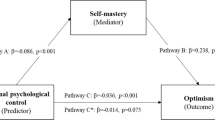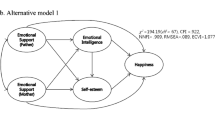Abstract
No previous studies have so far explicitly investigated the dynamic of parental love and children’s well-being in relation to optimism. The present study tested whether parental love had an impact on children’s well-being through optimism. To test the prediction, we administered a questionnaire package comprising the adult versions (short forms) of the Parental Acceptance-Rejection Questionnaire for Fathers and Mothers, (2) Life Orientation Test-Revised, (3) Satisfaction with Life Scale, (4) Positive and Negative Affect Schedule, and (5) the Mental Health Continuum-Short Form and a Personal Information Form to a convenience sample of 300 students of Dhaka University. Participants’ mean age was 21.8 years and was between the ages of 18 through 25 years. Independent sample t-tests revealed significant gender differences in most of the key variables in the study. Results of Pearson product-moment correlations showed that the men who perceived their mothers and fathers as more loving (accepting) were more optimistic and mentally healthy compared to other groups. Similarly, the women who perceived their mothers (but not fathers) as more loving were optimistic and mentally healthy compared to others groups. Results of simultaneous multiple regression analysis revealed that maternal love affected the well-being of both men and women partially through optimism. Unlike maternal love, paternal love affected the well-being of only men.












Similar content being viewed by others
Change history
17 June 2023
The first and last name for the first author, Muhammad Kamal Uddin, has been corrected in the metadata.
References
Acun-Kapikiran, N., Körükcü, Ö., & Kapikiran, Ş. (2014). The relation of parental attitudes to life satisfaction and depression in early adolescents: The mediating role of self-esteem. Educational Sciences: Theory and Practices, 14(4), 1246–1252.
An, J. S., & Cooney, T. M. (2006). Psychological well-being in mid to late life: The role of generativity development and parent-child relationships across the lifespan. International Journal of Behavioral Development, 30, 410–421.
Baker, C. N., & Hoerger, M. (2012). Parental child-rearing strategies influence self-regulation, socio-emotional adjustment, and psychopathology in early adulthood: Evidence from a retrospective cohort study. Personality and Individual Differences, 52(7), 800–805.
Barnow, S., Schuckit, M., Lucht, M., John, U., & Freyberger, H. J. (2002). The importance of positive family history of alcoholism, parental rejection and emotional warmth, behavioral problems and peer substance use for alcohol problems in teenagers: A path analysis. Journal of Studies on Alcohol, 63, 305–315.
Bennett, O. (2015). Cultures of Optimism: The Institutional Promotion of Hope. Palgrave Macmillan, p-115.
Bowlby, J. (1969). Attachment.Attachment and Loss, 1, Loss. New York: Basic Books. Retrieved in March 1, 2016 from: http://www.simplypsychology.org/bowlby.html
Bowlby, J. (1988). Attachment, communication, and therapeutic process.A Secure Base: Parent-Child Attachment and healthy human development, 137–157. Retrieved in March 1, 2016 from: http://www.simplypsychology.org/bowlby.html
Cacioppo, M., Pace, U., & Zappulla, C. (2013). Parental psychological control, quality of family context and life satisfaction among Italian adolescents. Child Indicators Research, 6(1), 179–191.
Cai, M., Hardy, S. A., Olsen, J. A., Nelson, D. A., & Yamawaki, N. (2013). Adolescent-parent attachment as a mediator of relations between parenting and adolescent social behavior and well-being in China. International Journal of Psychology, 48(6), 1185–1190.
Campbell, A., Converse, P. E., & Rodgers, W. L. (1976). The quality of American life: Perceptions, evaluations, and satisfactions. Russell Sage Foundation.
Carver, C. S., & Scheier, M. F. (2001). Optimism, pessimism, and sellf-regulation. In E. C. Chang (Ed.), Optimism and pessimism: Implications for theory, research, and practice (pp. 31–52). American Psychological Association.
Chakraborty, T., & Kim, S. (2010). Kinship institutions and sex ratios in India. Demography, 47(4), 989–1012.
Chang, E. C. (2002). Optimism-pessimism and stress appraisal: Testing a cognitive interactive model of psychological adjustment in adults. Cognitive Therapy and Research, 26(5), 675–690.
Chang, E. C., & Sanna, L. J. (2001). Optimism, pessimism, and positive and negative affectivity in middle- aged adults: A test of cognitive-affective model of psychological adjustment. Psychology and Aging, 16, 524–531.
Chowdhury, B. H. (2004). Women’s status in Bangladesh: A suggested framework for analysis. Empowerment, 11, 1–10.
Chowdhury, M. R., & Bairagi, R. (1990). Sex preferences and fertility in Bangladesh. Population and Development Review, 16, 749–767.
Chung, W., & Das Gupta, M. (2007). The decline of son preference in South Korea: The role of development and social policy. Population and Development Review, 33, 757–783.
Deveci Şirin, H. (2019). Parental acceptance–rejection and adult separation anxiety: The mediation of adult attachment insecurity. SAGE Open, 9(4), 2158244019885138.
Diener, E. D., Emmons, R. A., Larsen, R. J., & Griffin, S. (1985). The satisfaction with life scale. Journal of Personality Assessment, 49(1), 71–75.
Diener, E., Oishi, S., & Lucas, R. E. (2003). Personality, culture, and subjective well-being: Emotional and cognitive evaluations of life. Annual Review of Psychology, 54, 403–425.
Diener, M. L., & Diener McGavran, M. B. (2008). What makes people happy? A developmental approach to the literature on family relationships and well-being. In M. Eid & R. J. Larsen (Eds.), The science of subjective well-being (pp. 347–375). Guilford.
Eid, M., & Diener, E. (2004). Global judgments of subjective well-being: Situational variability and long-term stability. Social Indicators Research, 65, 245–277.
Ferguson, S. J., & Goodwin, A. D. (2010). Optimism and well-being in older adults: The mediating role of social support and perceived control. International Journal of Aging and Human Development, 71(1), 43–68.
Flouri, E., & Buchanan, A. (2003). The role of father involvement and mother involvement in adolescents’ psychological well-being. British Journal of Social Work, 33, 399–406.
Fotti, S. A., Katz, L. Y., Afifi, T. O., & Cox, B. J. (2006). The associations between peer and parental relationships and suicidal behaviors in early adolescents. Canadian Journal of Psychiatry, 51, 698–703.
Francis, D. R. (2016). Do father prefer sons? Retrieved in March 1, 2016 from: http://www.nber.org/digest/oct04/w10281.html
Galinha, I. C., & Pais-Ribeiro, J. L. (2011). Cognitive, affective and contextual predictors of subjective well-being. International Journal of well-being, 2(1), 34–53.
Ge, X., Best, K. M., Conger, R. D., & Simon, R. L. (1996). Parenting behaviors and the occurrence and co-occurrence of adolescent depressive symptoms and conduct problems. Developmental Psychology, 32(4), 717–731.
Graham, G. (2006). Attachment theory and well-being for the young person in residential care: The provision of a second chance secure base for the child in crisis. Relational Child and Youth Care Practice, 19(1), 1–25.
Hasnain, N., Wazid, S. W., & Hasan, Z. (2014). Optimism, hope, and happiness as correlates of psychological well-being among young adult assamese males and females. Journal of Humanities and Social Science, 19(2), II, 44–51.
Hjelle, L. A., Busch, E. A., & Warren, J. E. (1996). Explanatory style, dispositional optimism, and reported parental behavior. Journal of Genetic Psychology, 157(4), 489–499.
Hossain, M. M., Mani, K. K., & Islam, M. R. (2015). Prevalence and determinants of the gender differentials risk factors of child deaths in Bangladesh: Evidence from the Bangladesh demographic and health survey, 2011. PLoS Neglected Tropical Diseases, 9(3), e0003616.
Huppert, F. A., Abbott, R. A., Ploubidis, G. B., Richards, M., & Kuh, D. (2011). Parental practices predict psychological well-being in midlife: Life-course associations among women in the 1946 British birth cohort. Psychological Medicine, 40(9), 1507–1518.
Hussain, S., & Munaf, S. (2012). Perceived father acceptance-rejection in childhood and psychological adjustment in adulthood. International Journal of Business and Social Science, 3(1), 149–156.
Imam, F., & Shaik, S. I. (2005). Presence or absence of father’s love and personality development of the child. Pakistan Journal of Psychology, 36(1), 31–37.
Jasmine, U. H., Uddin, M. K., & Sultana, S. (2007). Adaptation of parental acceptance-rejection questionnaire and personality assessment questionnaire in Bangla language. Bangladesh Psychological Studies, 17, 49–70.
Kazarian, S. S., Moghnie, L., & Martin, R. A. (2010). Perceived parental warmth and rejection in childhood as predictors of humor styles and subjective happiness. Europe’s Journal of Psychology, 6(3), 71–93.
Kerns, K. A., Klepac, L., & Cole, A. K. (1996). Peer relationships and adolescents’ perceptions of security in the child-mother relationship. Developmental Psychology, 32, 457–466.
Keyes, C. L. M., Shmotkin, D., & Ryff, C. D. (2002). Optimizing well-being: The empirical encounter of two traditions. Journal of Personality and Social Psychology, 82(6), 1007–1022.
Keyes, C. L. M., Wissing, M., Potgieter, J. P., Temane, M., Kruger, A., & van Rooy, S. (2008). Evaluation of the Mental Health Continuum Short Form (MHC-SF) in Setswana speaking South Africans. Clinical Psychology and Psychotherapy, 15, 181–192.
Khaleque, A. (2002). Parental love and human development: Implications of parental acceptance-rejection theory. Pakistan Journal of Psychological Research, 17(3–4), 111–122.
Khaleque, A. (2013). Perceived parental warmth, and children’s psychological adjustment, and personality dispositions: A meta-analysis. Journal of Child and Family Studies, 22(2), 297–306.
Khaleque, A., & Rohner, R. P. (2002). Perceived parental acceptance-rejection and psychological adjustment: A meta-analysis of cross-cultural and intracultural studies. Journal of Marriage and the Family, 64, 54–64.
Khaleque, A., Shirin, A., & Uddin, M. K. (2013). Attachment relationships and psychological adjustment of married adults. Social Indicators Research, 110(1), 237–244.
Khaleque, A., Uddin, M. K., Shirin, A., & Akther, & Himi, S. A. (2016). Cognitive and contextual factors mediating the relation between interpersonal conflict and adolescents’ psychological maladjustments. Journal of Child and Family Studies, 25(2), 669–677.
Khan, A. (2013). Predictors of positive psychological strengths and subjective well-being among North Indian adolescents: Role of mentoring and educational encouragement. Social Indicators Research, 114(3), 54–64.
Khan, S. (2011). Relationship of parental acceptance and rejection with psychological wellness in young adults. Journal of Rawalpindi Medical College, 15(1), 24–26.
Kim, E. (2013). Korean American parental depressive symptoms and children’s mental health: The mediating role of parental acceptance–rejection. Journal of Pediatric Nursing, 28(1), 37–47.
Lamers, S. M. A., Westerhof, G. J., Bohlmeijer, E. T., ten Klooster, P. M., & Keyes, C. L. M. (2011). Evaluating the psychometric properties of the Mental Health Continuum-Short Form (MHC-SF). Journal of Clinical Psychology, 67, 99–110.
Leung, B. W., Moneta, G. B., & McBride-Chang, C. (2005). Think positively and feel positively: Optimism and life satisfaction in late life. International Journal of Aging and Human Development, 61(4), 335–365.
Liu, C., Cheng, Y., Hsu, A. S., Chen, C., Liu, J., & Yu, G. (2018). Optimism and self-efficacy mediate the association between shyness and subjective well-being among Chinese working adults. PloS one, 13(4).
Matthews, E. E., & Cook, P. F. (2009). Relationships among optimism, well-being, self-transcendence, coping, and social support in women during treatment for breast cancer. Psycho-Oncology, 18(7), 716–726.
Parmar, P., & Rohner, R. P. (2005). Relations among perceived intimate partner acceptance, remembered parental acceptance, and psychological adjustment among young adults in India. Ethos, 33, 402–413.
Parmar, P., & Rohner, R. P.(2008). Relations among spouse acceptance, remembered parental acceptance in childhood, and psychological adjustment among married adults in India. Cross-Cultural Research, 42, 57.
Pavot, W., & Diener, E. (1993). Review of the satisfaction with life scale. Psychological Assessment, 5, 164–172.
Prasad, J., & Kumari-Sinha, V. (2017). Maternal acceptance–rejection and psychological well-being of adolescents. International Journal of Science and Research, 6(4), 1867–1870.
Rasmi, S., Chuang, S. S., & Safdar, S. (2012). The relationship between perceived parental rejection and adjustment for Arab, Canadian, and Arab Canadian youth. Journal of Cross-Cultural Psychology, 43(1), 84–90.
Rohner, R. P. (1986). The warmth dimension: Foundations of parental acceptance-rejection theory. Storrs. Rohner Research Publications.
Rohner, R. P. (2000). Introduction, The Warmth Dimension, foundation of parental acceptance-rejection theory. Storrs, CT: Rohner Research Publications, pp. 14, 19.
Rohner, R. P. (2004). The parental “acceptance-rejection syndrome”: Universal correlates of perceived rejection. American Psychologist, 59, 827–840.
Rohner, R. P. (2005). Glossary of significant concepts in parental acceptance-rejection theory.In Rohner, R. P., & Khaleque, A. (Eds.) Handbook for the study of parental acceptance and rejection (4th edition), 379–398. Storrs, CT: Rohner Research Publications.
Rohner, R. P. (2008). Parental acceptance-rejection theory studies of intimate adult relationships. Cross-Cultural Research, 42(1), 5–12.
Rohner, R. P., & Britner, P. A. (2002). Worldwide mental health correlates of parental acceptance-rejection: Review of cross-cultural and intracultural evidence. Cross-Cultural Research, 36, 16–47.
Rohner, R. P., & Khaleque, A. (2005).Handbook for the student of parental acceptance and rejection (4thed.). Storrs, CT: Rohner Research Publications.
Rohner, R. P., & Rohner, E. C. (1980). Worldwide tests of parental acceptance-rejection theory [Special issue]. Behavioral Science Research, 15(1).
Rohner, R. P., Bourque, S. L., & Elordi, C. A. (1996). Children’s perceptions of corporal punishment, caretaker acceptance, and psychological adjustment in a poor, biracial southern community. Journal of Marriage and the Family, 58, 842–852.
Rohner, R. P., & Lansford, J. E. (2017). Deep structure of the human affectional system: Introduction to Interpersonal Acceptance-Rejection Theory. Journal of Family Theory & Review, 9(4), 426–440. https://doi.org/10.1111/jftr.12219
Ryan, R. M., & Deci, E. L. (2001). On happiness and human potentials: A review of research on hedonic and eudaimonic well-being. Annual Review of Psychology, 52, 141–166.
Ryff, C. D., & Singer, B. (1998). The contours of positive human health. Psychological Inquiry, 9, 1–28.
Ryff, C. D., Singer, B. H., & Love, G. D. (2004). Positive health: Connecting well-being with biology. Philosophical Transactions of the Royal Society of London, 359, 1383–1394.
Saha, R., Huebner, E., Suldo, S., & Valois, R. (2010). A longitudinal study of adolescent life satisfaction and parenting. Child Indicators Research, 3(2), 149–165.
Saritas-Atalar, P. D., & Gençöz, P. T. (2015). The mediating role of early maladaptive schemas in the relationship between maternal rejection and psychological problems. Turk Psikiyatri Dergisi, 26(1), 40.
Scheier, M. F., & Carver, C. S. (1992). Effects of optimism on psychological andphysical well-being: Theoretical overview and empirical update. Cognitive Therapy and Research, 16, 201–228.
Scheier, M. F., Carver, C. S., & Bridges, M. W. (1994). Distinguishing optimism from neuroticism (and trait anxiety, self-mastery, and self-esteem): A re-evaluation of the Life Orientation Test. Journal of Personality and Social Psychology, 67, 1063–1078.
Sivis-Cetinkaya, R. (2013). Turkish college students’ subjective well-being in regard to psychological strengths and demographic variables: Implications for college counseling. International Journal for the Advancement of Counseling, 35(4), 317–330.
Stafford, M., Kuh, D. L., Gale, C. R., Mishra, G., & Richards, M. (2016). Parent–child relationships and offspring’s positive mental wellbeing from adolescence to early older age. The Journal of Positive Psychology, 11(3), 326–337.
Tillman, K. S., & Juntunen, C. L. (2013). Parental acceptance-rejection theory and court-involved adolescent females: An exploration of parent-child relationships and student-teacher relationships. Journal of Juvenile Justice, 2(2), 46–62.
Türkdoğan, T. (2017). The relationship between university students’ retrospectively perceptions of parental acceptance-rejection about childhood and their psychological adjustments in adulthood. Turkish Psychological Counseling and Guidance Journal, 7(47), 135–154.
Uddin, M. K., & Nahar, N. (2015). Bangla translation of the Life Orientation Test-Revised (LOT-R). Department of Psychology, University of Dhaka.
Uddin, M. K., & Nahar, N. (2016a). Bangla translation of the Positive and Negative Affect Schedule (PANAS). Department of Psychology, University of Dhaka.
Uddin, M. K., & Nahar, N. (2016b). Bangla translation of the Satisfaction with Life Scale (SWLS). Department of Psychology, University of Dhaka.
Uddin, M. K., Khaleque, A., Aktar, R., & Hossain, K. N. (2014). Relations between perceived parental acceptance and children’s psychological adjustment in the context of differential parental power and prestige in Bangladesh. Cross-Cultural Research, 48(3), 214–222.
Ünüvar, Ş, Avşaroğlu, S., & Uslu, M. (2012). An evaluation of optimism and life satisfaction of undergraduate students in the school of tourism and hotel management. Asian Social Science, 8(12), 140–147.
Veneziano, R. A., & Rohner, R. P. (1998). Perceived paternal acceptance, paternal involvement, and youth’s psychological adjustment in a rural, biracial southern community. Journal of Marriage and the Family, 60(2), 335–343.
Veneziano, R. A. (2003). The importance of parental warmth. Cross-Cultural Research, 37, 265–281.
Waterman, A. S., Schwartz, S. J., & Conti, R. (2008). The implications of two conceptions of happiness (hedonic enjoyment and eudaimonia) for the understanding of intrinsic motivation. Journal of Happiness Studies, 9, 41–79.
Watson, D., Clark, L. A., & Tellegen, A. (1988). Development and validation of brief measures of positive and negative affect: The PANAS scale. Journal of Personality and Social Psychology, 54(6), 1063–1070.
Yamawaki, N., Nelson, J. A. P., & Omori, M. (2011). Self-esteem and life satisfaction as mediators between parental bonding and psychological well-being in Japanese young adults. International Journal of Psychology and Counseling, 3(1), 1–8.
Yoon, E., Lee, R. M., & Goh, M. (2008). Acculturation, social connectedness, and subjective well-being. Cultural Diversity and Ethnic Minority Psychology, 14(3), 246–255.
Author information
Authors and Affiliations
Corresponding author
Rights and permissions
Springer Nature or its licensor (e.g. a society or other partner) holds exclusive rights to this article under a publishing agreement with the author(s) or other rightsholder(s); author self-archiving of the accepted manuscript version of this article is solely governed by the terms of such publishing agreement and applicable law.
About this article
Cite this article
Uddin, M.K., Nahar, N. & Parvin, M. Parental Love and Well-Being of Young Adults: the Mediating Role of Optimism. Trends in Psychol. 32, 61–83 (2024). https://doi.org/10.1007/s43076-022-00185-4
Accepted:
Published:
Issue Date:
DOI: https://doi.org/10.1007/s43076-022-00185-4




